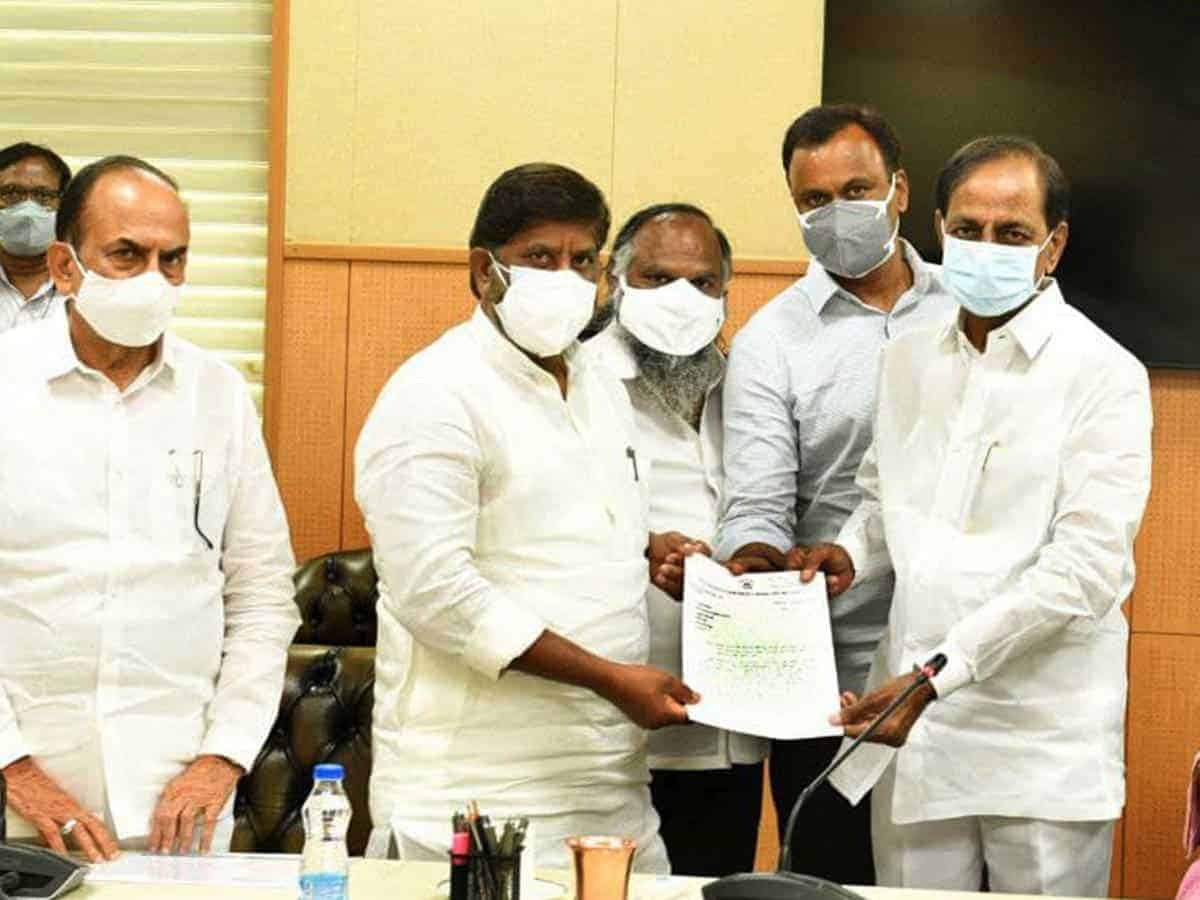Hyderabad: Last Friday, Telangana Congress leaders were taken by surprise when they received a call from Pragati Bhavan, the official bungalow of chief minister K Chandrasekhar Rao, saying that he would like to meet them.
The Congress leaders were coming out of Raj Bhavan after submitting a memorandum to Governor Tamilisai Soundarrajan seeking stringent action against the police officials responsible for the death of a Dalit woman when they received the invite.
The 40-year-old Mariyamma had died in the police custody at Addaguduru police station in Yadadri Bhongir district on June 18.
The new development was surprising even to the media, which immediately flashed the news to their channels and websites. For, it was for the first time after taking over as the chief minister of Telangana in June 2014 that KCR had given an appointment to the Congress MLAs.
Unlike his predecessors in the Congress and the Telugu Desam Party regimes in the combined Andhra Pradesh who used to meet with the opposition delegations on various issues and conduct all-party meetings on important policy decisions, KCR followed a unique style of his own.
In the last seven years, he has never met any opposition MLAs except when they wanted to shift their loyalties to the ruling Telangana Rashtra Samithi. Other than the leaders of his friendly party – Majlis-e-Ittehadul Muslimeen (MIM), the Congress or the BJP MLAs had failed to get an appointment to meet KCR, inside or outside the state assembly.
The last time that a delegation of the Congress leaders made a futile attempt to submit a memorandum to the chief minister was in July 2018, when eight Dalit youths of Nerella village of Siricilla district were tortured in the police station for torching a sand lorry that killed a local youth.
After that, the opposition leaders stopped asking KCR for appointment. So, it was rather a surprise for the Congress leaders on last Friday when they were told that he wanted to meet them.
When the delegation led by Congress Legislature Party Leader and Madhira MLA Mallu Bhatti Vikramarka met the chief minister, he not only received them well but also spoke to each of them affectionately, before conceding their demands for ex-gratia to the family of the custodial death victim and sacking of the erring police officials.
Within hours, there was another surprising development. The chief minister sent invitations to the opposition parties, including the Congress, the BJP, the MIM, CPI and CPI (M) to send their Dalit representatives for an all-party meeting on Sunday to discuss the modalities of the CM Dalit Empowerment Programme.
It was a day-long session which ended at 10 pm and the chief minister offered sumptuous lunch and dinner for the opposition representatives. He also patiently heard the leaders and incorporated some of their suggestions in the programme.
The latest developments clearly indicate that there is a perceptible change in the attitude of KCR in the recent past – not just in entertaining the opposition parties and giving value to their suggestions, but also in his functioning as the administrative head.
Right from the beginning, KCR had been a ruler with a difference. Except on a couple of occasions in his early days as the chief minister, he never visited the Secretariat, the seat of administration. The entire official machinery comes to his camp office to attend the meetings.
Unlike his predecessors, KCR never regularly conducted cabinet meetings, which are essential to take crucial policy decisions. He never gave freedom to his ministers (except of course his son K T Rama Rao) to conduct review meetings of their respective departments. If there were any important decisions in any department, the chief minister himself conducted review meetings.
His focus areas were mostly irrigation and agriculture and if at all, KCR held any regular review, they were only on Kaleshwaram irrigation project and agriculture-oriented schemes like Rythu Bandhu.
Unlike the other chief ministers, KCR had not shown much interest in field visits to understand the people’s issues directly. Except during the elections, he never made any extensive tours of any part of the state. His favourite field visits were mostly to Kaleshwaram project sites and Yadadri temple. One can count on finger tips about his field visits and most of them would be to Gajwel or Siddipet.
Even when there were major accidents like the death of over 60 people in a bus accident at Kondagattu in Jagitial district in September 2019, KCR never bothered to call on the bereaved families.
After becoming the chief minister, KCR virtually stopped going to even Telangana Bhavan, the TRS headquarters, to meet the party functionaries. Forget the opposition leaders, he had not been accessible even to the ministers and MLAs. As former health minister Eatala Rajender pointed out, there were many occasions when the ministers were denied audience even after being made to wait for more than four hours.
Now, KCR appears to be a changed man, particularly after Eatala episode. He has been regularly meeting his party leaders and taking their representations. He has started conducting official review meetings on various subjects and even the cabinet meetings quite regularly. He has also been holding Collectors’ Conferences to review the progress of various developmental works.
His recent visit to Vasalamarri village of Yadadri Bhongir where he had community lunch with the villagers was also a surprising development. His official tours to Siddipet and Warangal indicate that he wants to be seen and heard more in public.
Apparently, KCR has sensed the growing anti-incumbency among the people in his second term and the strengthening of the opposition, particularly the BJP. He has realised that he needs to give up his feudalistic style of governance and become more democratic, if he wants to retain the support of the masses.
A Srinivasa Rao is Senior Journalist based out of Hyderabad covering developments in Andhra Pradesh and Telangana . He has over three decades of reporting experience.

